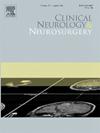三环抗抑郁药与5 -羟色胺-去甲肾上腺素再摄取抑制剂预防偏头痛的疗效和安全性比较:一项系统综述和荟萃分析
IF 1.6
4区 医学
Q3 CLINICAL NEUROLOGY
引用次数: 0
摘要
偏头痛是全球致残的主要原因,但由于其潜在机制尚不清楚,对预防性干预措施的研究仍然有限。我们进行了一项系统回顾和荟萃分析,以评估三环抗抑郁药(TCAs)与5 -羟色胺-去甲肾上腺素再摄取抑制剂(SNRIs)在偏头痛预防方面的比较疗效和安全性。方法按照PRISMA指南进行系统评价。PubMed、Embase和Cochrane Central数据库检索了从成立到2024年12月的随机对照试验(rct),比较选择性去甲肾上腺素再摄取抑制剂(SNRIs)和三环抗抑郁药(TCAs)在偏头痛患者中的作用。两名独立审稿人筛选研究,提取数据,并使用RoB 2工具评估偏倚风险。随机效应模型应用于池效应估计,报告平均差异(MD)和风险比(RR), 95% %置信区间(ci),使用Review Manager v.5.4。结果在筛选的4253篇文章中,共有3项随机试验符合纳入标准,包括333例患者(平均年龄32.4岁,68% %女性),平均随访10周。与基线相比,SNRI组和TCA组每月偏头痛天数(MMD)均减少,两者之间无显著差异(MD = - 0.03, 95 % CI: - 0.67-0.61; p = 0.93)。然而,与TCAs相比,SNRIs在偏头痛发作持续时间的减少上略微更大(MD = - 0.71, 95 % CI: - 1.41至- 0.01;p = 0.05),不良事件发生率显著降低(RR = 0.68, 95 % CI: 0.51-0.91; p = 0.009)。结论snris与TCAs在减少每月偏头痛天数方面具有相当的疗效,且发作时间更短,不良事件更少。本文章由计算机程序翻译,如有差异,请以英文原文为准。
Comparative efficacy and safety of tricyclic antidepressants vs. serotonin-norepinephrine reuptake inhibitors for migraine prophylaxis: A systematic review and meta-analysis
Introduction
Migraine is a leading cause of global disability, yet research on prophylactic interventions remains limited due to unclear underlying mechanisms. We performed a systematic review and meta-analysis to evaluate the comparative efficacy and safety of tricyclic antidepressants (TCAs) versus serotonin-norepinephrine reuptake inhibitors (SNRIs) for migraine prophylaxis.
Methods
A systematic review was executed in accordance with PRISMA guidelines. PubMed, Embase, and Cochrane Central databases were searched from inception to December, 2024 for randomized controlled trials (RCTs) comparing selective norepinephrine reuptake inhibitors (SNRIs) with tricyclic antidepressants (TCAs) in migraine patients. Two independent reviewers screened studies, extracted data, and assessed risk of bias using the RoB 2 tool. A random-effects model was applied to pool effect estimates, reporting mean differences (MD) and risk ratios (RR) with 95 % confidence intervals (CIs), using Review Manager v.5.4.
Results
Out of 4253 screened articles, a total of three randomized trials met the inclusion criteria, encompassing 333 patients (mean age 32.4 years, 68 % female) with a mean follow-up of 10 weeks. Both SNRI and TCA groups reduced monthly migraine days (MMD) compared to baseline, with no significant difference between them (MD = −0.03, 95 % CI: −0.67–0.61; p = 0.93). However, SNRIs demonstrated a marginally greater reduction in migraine attack duration (MD = −0.71, 95 % CI: −1.41 to −0.01; p = 0.05) and a significantly lower incidence of adverse events compared to TCAs (RR = 0.68, 95 % CI: 0.51–0.91; p = 0.009).
Conclusion
SNRIs demonstrated comparable efficacy to TCAs in reducing monthly migraine days, with shorter attack duration and fewer adverse events.
求助全文
通过发布文献求助,成功后即可免费获取论文全文。
去求助
来源期刊

Clinical Neurology and Neurosurgery
医学-临床神经学
CiteScore
3.70
自引率
5.30%
发文量
358
审稿时长
46 days
期刊介绍:
Clinical Neurology and Neurosurgery is devoted to publishing papers and reports on the clinical aspects of neurology and neurosurgery. It is an international forum for papers of high scientific standard that are of interest to Neurologists and Neurosurgeons world-wide.
 求助内容:
求助内容: 应助结果提醒方式:
应助结果提醒方式:


